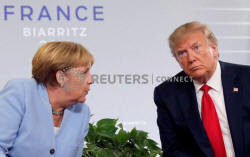'Germany is not safe' despite smaller trade surplus with
U.S.: trade experts
 Send a link to a friend
Send a link to a friend
 [February 12, 2020] By
Michael Nienaber and Rene Wagner [February 12, 2020] By
Michael Nienaber and Rene Wagner
BERLIN (Reuters) - Germany's trade surplus
with the United States narrowed slightly last year, data showed on
Wednesday, but that is unlikely to assuage U.S. President Donald Trump
who has stepped up his attacks on the European Union over trade.
German exports of goods to the United States in 2019 hit an all-time
high, the Federal Statistics Office data showed, even though Germany
also bought more U.S. vehicles, animal feed and pharmaceuticals in a
modest rebalancing of trade.
Trump, long critical of Germany's big surpluses, signaled on Monday that
he wanted to restructure the more than $1 trillion U.S. trade
relationship with the EU, raising the specter of another major tariff
war as the global economy slows and he seeks re-election.
"Germany is not safe," Gabriel Felbermayr, president of the Kiel
Institute for the World Economy, told Reuters.

After Trump claimed trade policy victories against China, Korea, Japan,
Mexico and Canada, it is likely that he will now turn his anger towards
the euro zone, said Felbermayr. Germany is the EU's biggest economy and
by far its biggest exporter.
"Even if the U.S. deficit with Germany has fallen a little bit, U.S.
data suggest that the deficit with the euro zone has gone up quite
substantially," Felbermayr said, adding that Germany still accounts for
more than 40% of that imbalance.
The U.S. trade deficit with Germany edged down by 1.5 billion euros to
some 47 billion euros last year, helped by a surge in German imports,
the new data showed.
Excluding services, German goods exports to the United States rose by
4.7% in 2019 to a record high of nearly 119 billion euros ($130
billion), the data showed.
"WORSE THAN CHINA"
Overall, German export growth slowed to 0.8% last year after 3.0% in
2018 and 6.2% in 2017, the data showed, as manufacturers faced weaker
global demand and increased business uncertainty linked to trade
disputes and Brexit.
[to top of second column] |

U.S. President Donald
Trump meets German Chancellor Angela Merkel for bilateral talks
during the G7 summit in Biarritz, France, August 26, 2019.
REUTERS/Carlos Barria/File Photo

Trump has said the EU is "worse than China" on trade and has repeatedly
threatened to impose higher import tariffs on European cars, which would hit
Germany especially hard. Germany narrowly avoided slipping into recession last
year.
Jens Suedekum, a trade expert at the Heinrich-Heine-University in Duesseldorf,
said the United States remained the top destination for German exports partly
because Washington's major tariff disputes had so far been more with China.
"This alone boosts German exports, which become cheaper for American consumers
when compared to Chinese goods on which they have to pay tariffs," Suedekum
said.
Demand for German goods in the United States has also benefited from the robust
state of the U.S. economy, buoyed by massive deficit spending and tax cuts, he
added.
"The United States and China have reached a ceasefire at the moment, so Trump
will shift his attention towards Europe, and Germany in particular," Suedekum
cautioned.
"The German export surplus is one of the major annoyances for him, and he might
punish the entire EU for that."

France remains Germany's second-biggest export market, with foreign sales rising
by 1.4% to nearly 107 billion euros.
China again came in third place last year, with German exports growing by 3.2%
to 96 billion euros.
Combining exports and imports, China remained Germany's biggest trading partner,
with a volume of 206 billion euros in 2019.
(Reporting by Michael Nienaber; Editing by Gareth Jones)
[© 2020 Thomson Reuters. All rights
reserved.] Copyright 2020 Reuters. All rights reserved. This material may not be published,
broadcast, rewritten or redistributed.
Thompson Reuters is solely responsible for this content. |